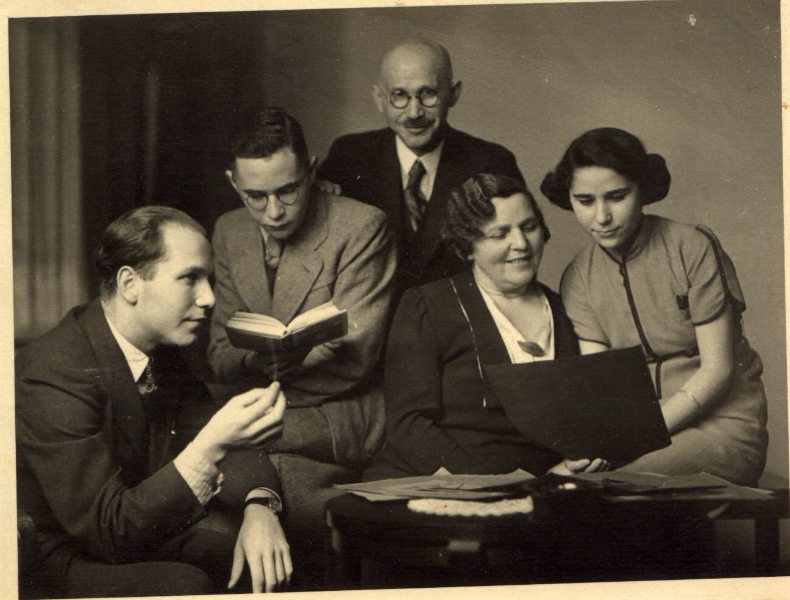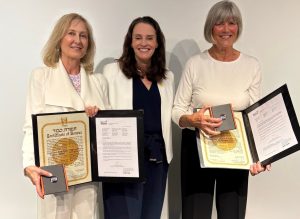Rabbi Erwin Schild, who survived Kristallnacht and internment at the Dachau concentration camp to go on to lead one of Toronto’s largest Conservative synagogues for over 40 years, died Jan. 6. He was 103.
Rabbi Schild’s life encompassed some of the worst moments of Jewish life in the 20th century. Born in Cologne, Germany, March 9, 1920, he was imprisoned in Dachau in 1938. After fleeing first to the Netherlands and then England, he ended up in Canada, where he was again interned, this time as an enemy alien.
He served as spiritual leader from 1947 to 1989 of Adath Israel in Toronto, one of the city’s largest Conservative synagogues. Under his purview, the congregation grew from 180-member families to 1,900.
Family and colleagues fondly recollected his warmth, affability and scholarly mind.
Rabbi Adam Cutler, the current spiritual leader of Adath Israel, spoke at the Jan. 8 funeral about how Rabbi Schild showed him old sermon notes, rough enough that they “allowed him to speak from his soul,” and said “his tacit advice to me was to do the same.” Rabbi Cutler recalled Rabbi Schild’s “visionary leadership,” and his vast Torah scholarship.
“He was someone who was always very kind and looked out for the wellbeing of the entire staff – whether that was the clergy, or front office staff, or maintenance staff. He always had an eye out and made sure everyone was treated well. He wanted to foster an atmosphere of respect for everybody,” Rabbi Cutler told The CJN. “He always wanted to lend a hand when he could, be it when he was rabbi, or rabbi emeritus. He wanted to look out for who he could offer guidance.”
Rabbi Emeritus Philip Scheim, of Beth David B’nai Israel Beth Am, wrote of his admiration of Rabbi Schild, on the Benjamin’s funeral home website. When he assumed the role of rabbi forty years ago, it was Rabbi Schild’s “guidance and sage advice, especially in those challenging early years and throughout my career,” that proved invaluable.
His daughter Judith Weinroth recalled that even until last week, Rabbi Schild took time to show concern to community members, and called a congregant whose wife had passed away.
“That’s the kind of person he was, the connection to people,” she told The CJN. As a young man he initially thought of becoming a university professor, she said, but he decided to be a rabbi so he could be with people.
“We had our family, and the shul family – and they weren’t just congregants. We had close friends who felt part of the family,” she said. “He was really a people person.”
Despite the work that took a lot of his time, he always made time for family, she added.
Rabbi Schild’s parents were killed during the Holocaust, he was 18 when he last saw them. “He had the zechut (merit) to have children to the fifth generation; that’s something he really treasured, because that’s something his parents didn’t have the opportunity to have,” she said.
His nephew Ed Schild said his uncle was a religious beacon. “The more I learned from him, the more I needed to learn.”
Decades ago, the young Ed, originally from Macon, Georgia, occasionally visited his Toronto uncle and aunt, and he credits the rabbi with inspiring him to explore his Jewish roots.
“These were beautiful Shabboses. We saw him as an enlightening figure. Every time I visited him, he was sitting at the dining room table, putting his speeches in order, and reading Jewish books,” he told The CJN.
“He’d have a halakhah book open, a Jewish magazine open, or Gemara open. When he spoke, he was incredibly inspiring. Even after his retirement, his head was always sharp, he knew exactly what he was saying, he remembered the speeches he made.”
Rabbi Schild attended public school until age 16, but was forcibly removed as Nazi laws became harsher. He was a teenage yeshiva student in Wuerzburg, in southern Germany, when he was captured by the Nazis on Kristallnacht, Nov. 9 1938. He was sent to Dachau, and later freed when his mother showed the Gestapo an affidavit in his name stating that he was eligible for an immigration visa to the Dominican Republic if he appeared at their consulate in Cologne.

His initial escape led him to the Netherlands, and then to England where he resumed his academic studies. By 1940, following a year-long sojourn in London, he was transported to Canada, where he was detained alongside fellow German-Jewish exiles who were suspected of being Nazi supporters.
Ultimately, with the intervention of the Canadian Jewish Congress, he was released in 1942.
His education resumed at the University of Toronto and Yeshiva Torath Chaim. Under the counsel of Rabbi Abraham Price, the yeshiva’s head, and a key figure in securing the freedom of several interned youths, Rabbi Schild earned bachelor’s and master’s degrees in Semitic Languages and Literature.
In 1940, his brother Kurt emerged as one of the final Jews departing Germany. Meanwhile, his younger sister, Margot, had been sent to concentration camps, and endured a death march, eventually relocating to the United States. Rabbi Schild would discover the fate of his parents and childhood companions, who perished during the Holocaust.
“In retrospect, my adversities were part of my education. Persecution, prison, concentration camp, internment, poverty, destitution and hardship matured me. My experiences gave me new insights into the human capacity for good and evil, endurance and despair, and deeper appreciation of freedom and justice,” Rabbi Schild wrote on the shul’s website.
Two years after the war, a 27-year-old Rabbi Schild became the leader of what was then called the Romanian (Rumanishe) Shul, on Bathurst Street, just north of College Street.
“Their enthusiasm, and the magnetic dedication of lay leaders, enabled us to grow and to build a new synagogue in North York,” Rabbi Schild wrote online, about what would become Adath Israel.
He married Laura (nee Saxe) Dec. 31, 1944 and they would make a home–where he stayed until his death—a short walk from the new synagogue. They had three children.
At a celebration marking the quarter-century of his ordination, in 1972, the congregation named a wing of the building in his honour. It was among a string of lifetime accolades, including the Officer’s Cross of the Order of Merit of the Federal Republic of Germany in 2000 for his work in promoting Jewish-Christian relations and Holocaust education. He was named a Member of the Order of Canada in 2001.
In 2014 Rabbi Schild travelled to Germany on a speaking engagement, which his grandson Aaron Weinroth, was privileged to join. Weinroth recalled his grandfather showed him Cologne, his place of birth, as well as the family cemetery, and places of his childhood.
On the trip, Rabbi Schild spoke at an event taking place at Dachau, where he had been imprisoned. “To be able to have me there with him, was a special moment between the two of us. To be able to share that with a family member, and not just going alone, doing the job, was meaningful for him,” Weinroth said.
Condolence notes have flooded in from Germany, he said.
Judy Feld-Carr, a friend of Rabbi Schild’s, recalled a meeting in 1983, when the rabbi took her aside in the shul hallway, and revealed that he knew of her undercover work to free Syrian Jews. She remembers trembling when he said: “There was nobody there for us when we were dying in those camps.”
“This was very emotional for him, because it was the saving of Jewish lives, and he was a Holocaust survivor. So it really meant a great deal to him.”
Feld-Carr said that Rabbi Schild made an announcement in the shul almost every Shabbat to raise funds to bribe Syrian officials to let Jews out of the country. But one week was different. Word came that three Jews—a pregnant woman and her two children—were targeted, and brutally murdered by the regime, and the authorities made no secret that the woman’s sister was next.
Out of desperation, Feld-Carr called Rabbi Schild, as she “needed a fortune in money,” and needed it for Shabbat Zachor, the Shabbat immediately preceding Purim.
“I was going to do a deal for that family, like I’ve never paid before in my life,” she told The CJN. She heard from congregants that Rabbi Schild “made the most impassioned speech,” and all the necessary money came in—which included a donation from the rabbi. “I will never forget that,” she said.
She was also given the honour of introducing him at the 2001 synagogue launch of his autobiography A Very Narrow Bridge: Memoir of An Uncertain Passage, for which he won a Canadian Jewish Book award.
Rabbi Schild wrote three other books: World through My Window (1992), And Miles to Go Before I Sleep (2012), and The Crazy Angel (2017).
“To me, he was the epitome of what a rabbi should be,” said Feld-Carr “He was a good human being, a decent, wonderful man, who’d gone through a lot in his life, and used it to feel your problems and your joy.”
Erwin Schild is survived by three children: Daniel Schild, Dr. Judith Weinroth and Naomi Weitz, 12 grandchildren and many great-grandchildren and great-great-grandchildren. His wife Laura died in 2017.







